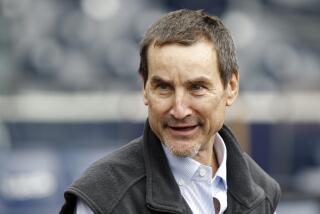Cast Adrift in the Home of the Braves
- Share via
WEST PALM BEACH, Fla. — The deal consummated by Deion Sanders and the Atlanta Braves parallels, in one respect, the transaction involving Bo Jackson and the Kansas City Royals.
Both open the year playing baseball.
From that point forward, each follows a different course. Whereas Bo finishes the baseball season with Kansas City and gives the Raiders two-thirds of a year of football, Sanders departs baseball July 31 and gives a full year of football to the Atlanta Falcons.
With an eye to history, Deion aims to become the first pro in 30 years to play two sports in the same city. In 1961, Gene Conley performed in Boston for the Celtics and the Red Sox.
This has nothing to do with the dumping of tea into Boston Harbor, but Conley, a pitcher rising 6 feet 8, always is remembered by Gene Mauch as the party delivering the hardest punch in Mauch’s experience.
Recalled Gene: “He hit me so hard one day that he knocked down two guys--me and our shortstop standing behind me.”
The business problems of Sanders are complicated by the fact he belongs to the Braves but hasn’t yet made their team.
Right now, he is assigned to Richmond, which is triple-A, like the auto club. To advance from Richmond to Atlanta, Deion must prove he can hit better in the major leagues than .158, his figure of last year with the New York Yankees.
The Yankees were so impressed, they gave him an unconditional release, which Michael Milken would like to have, but which is rated no badge of honor in baseball.
At 23, Deion, a prime punt returner, was liked by the Yankees, regretting they couldn’t use him to catch a fly ball and run with it through a broken field.
But the Braves are more adventuresome, possibly borne of misery. In the five seasons preceding this one, they have finished last four times.
Conditions are so grim that Ted Turner, proprietor, takes his general manager, Bobby Cox, and appoints him field manager, replacing him in the front office with John Schuerholz, whom Turner bags from Kansas City.
In view of all the accidents befalling the Braves, it is little wonder Turner isn’t seen at many games.
Players, in fact, recall seeing him but once in 1990. At Los Angeles, he turns up for the game with Jane Fonda, her two children and her former husband, Tom Hayden.
This is a nice touch--civilized America.
But the Braves are a modern force, further evidence of which is found in their biographical sketch of Sanders. It reads: “Full name: Deion Luwynn Sanders. Sanders and his girlfriend, Carolyn Chambers, have one daughter, Diondra.”
Bobby Cox is a lifetime baseball type, neither upset nor embarrassed by having to leave the general managership to conduct affairs on the field, as he did previously at Atlanta and Toronto.
“As long as I am involved in some phase of the game, I am happy,” he testifies.
“What appears to be the problem here?” he is asked, with the prospect of inviting a long answer.
“We led the majors in errors,” he replies quietly. “We made 158. Fifty-two were committed at the corners (first and third). You might say we weren’t beating anyone with our gloves, except ourselves.”
To help rectify this distressing matter, Turner peeled off $10.2 million to sign a free agent from St. Louis, third baseman Terry Pendleton.
Discovering he got Pendleton for four years at that sum, Ted offered thanks. In today’s market, the player could have asked that much for 1991.
Someone then plays a cruel joke on Ted, letting word escape that he Braves are going to give up Dave Justice, Tom Glavine “and other prospects” for Jose Canseco.
Logically, Cox asks: “Where were we going to get those other prospects ?”
Canseco could help the Braves if they had to drive from Atlanta to Augusta in seven minutes.
If the Braves haven’t been successful on the field, they have made up for it by finishing last in attendance, too. They drew only 980,000 in 1990. They haven’t drawn a million since 1987.
But you never hear Turner complain. He can recall that the year before he bought the club in 1976, the Braves played Houston at home one day and drew 737.
Apart from that, what happens to the Braves is a windfall compared to what happens with the Goodwill Games, which Ted also bankrolls.
But it must not be assumed that all he produces is losers, proof of which is, he rises from vice president of the Debating Union at Brown to one of society’s richer guys.
He also is lucky in love. And his fiancee works. A reasonable man can’t ask for a lot more.
More to Read
Go beyond the scoreboard
Get the latest on L.A.'s teams in the daily Sports Report newsletter.
You may occasionally receive promotional content from the Los Angeles Times.










